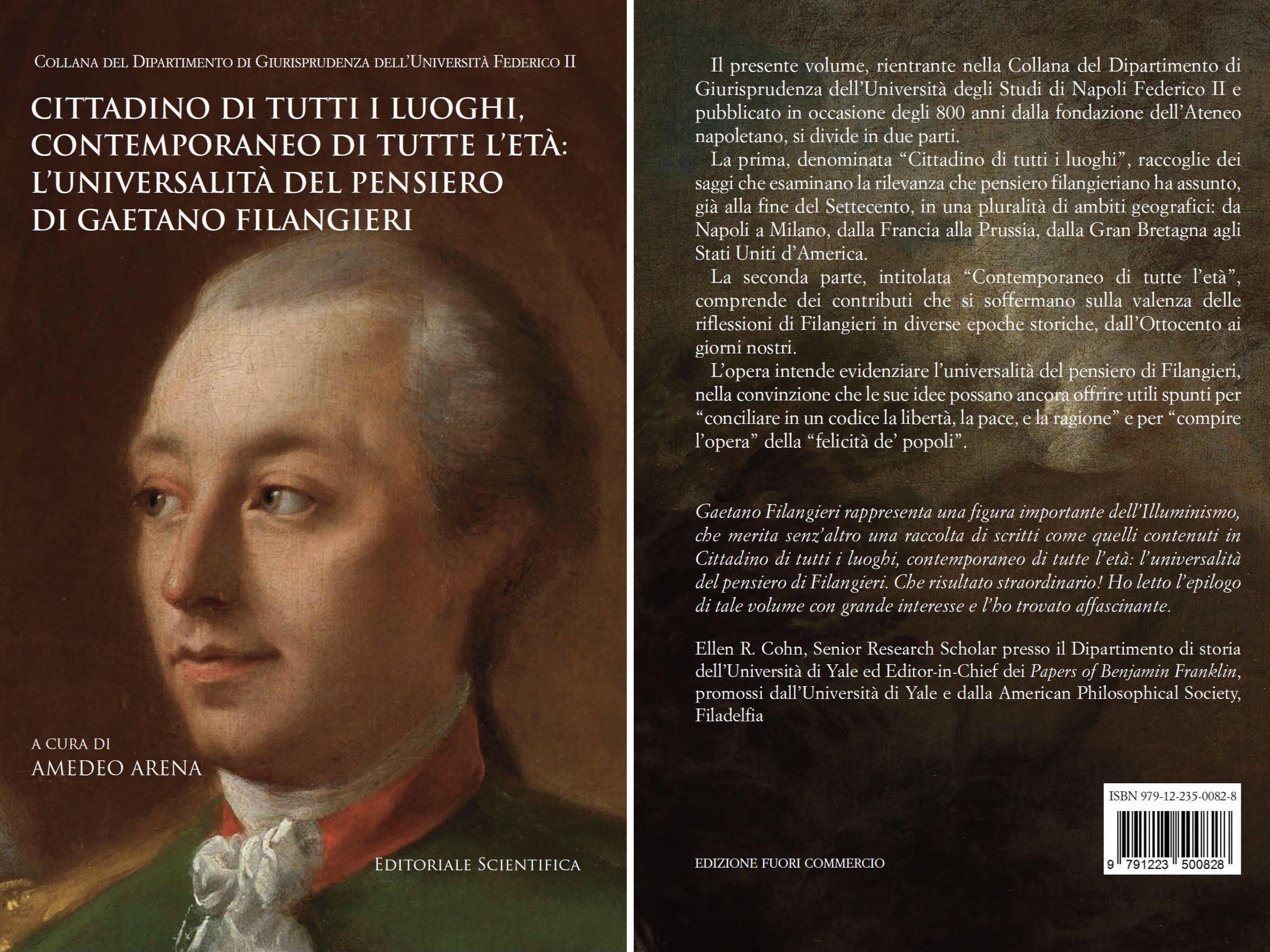
“A Citizen of All Places, Contemporary of All Ages”: A Volume Celebrates the Legacy of Neapolitan Enlightenment Philosopher Gaetano Filangieri

Edited by Professor Amedeo Arena of the University of Naples Federico II – the Italian university celebrating its 800th anniversary this year – the book Cittadino di tutti i luoghi, contemporaneo di tutte l’età: l’universalità del pensiero di Filangieri brings together essays by legal scholars, historians, and philosophers, exploring the universal relevance of the great Neapolitan Enlightenment thinker Gaetano Filangieri.
This edited volume is the latest addition to the University of Naples Federico II’s Faculty of Law book series, published by the Neapolitan academic press Editoriale Scientifica. The book also includes transcriptions of the letters exchanged between Filangieri and Benjamin Franklin, written between the end of the American Revolutionary War and the Philadelphia Convention.
The volume opens with introductory contributions by Mariangela Zappia, Italy’s Ambassador to the United States; Riccardo Imperiali di Francavilla, representing the Filangieri family at the Filangieri Civic Museum; Antonio Giordano, board member of the National Italian American Foundation and founder of the Sbarro Health Research Organization; Benedetto Migliaccio, President of the Accademia Filangieri di Partenope; and Stefaan van der Jeught, Professor of European Union Law at the Vrije Universiteit Brussel and Press Officer at the European Court of Justice.
The first section of the book, entitled A Citizen of All Places, examines Filangieri’s relevance across different cultural contexts, from Naples to Milan, France to Prussia, Britain to the United States. Vincenzo Ferrone’s chapter opens the section by criticizing the Anglo-American narrative framing human rights as a postmodern invention, underscoring the Enlightenment’s role in fostering new ideals. Franca Pirolo’s contribution highlights Filangieri’s opposition to feudalism in the Kingdom of Naples and explores his strategies to dismantle entrenched power structures. Valeria Ferrari’s chapter examines Filangieri’s proposals to abolish feudal privileges and promote social justice.
The contribution by Francesco Berti and Dario Ippolito compares Filangieri’s ideas on criminal law with those of Cesare Beccaria, showing how Filangieri expanded Beccaria’s vision in several respects. Antonio Trampus’s chapter explores Filangieri’s influence on Napoleon’s codifications, highlighting the connections between Filangieri’s legal principles and those of the Napoleonic era. Francesco Mariani’s chapter analyzes Filangieri’s reflections on standing armies and compares his ideas on pacifism with those of Immanuel Kant. Fabrizio Simon’s chapter compares Filangieri’s and Adam Smith’s views on a “just society,” highlighting the key differences in their approaches to individual and social order. Alessandro Maurini’s contribution discusses Filangieri’s influence on Benjamin Franklin and examines his contribution to the American debates on civil rights and slavery.
The second section, entitled Contemporary of All Ages, addresses Filangieri’s enduring relevance from the early 19th century to the present day. Valeria Marzocco’s chapter analyzes the connection between Filangieri’s thought and constitutionalism, focusing on his contributions to modern theories of legal limitations on power. Raffaele Sabato’s contribution discusses the obligation to provide reasons for judicial decisions, tracing its development from the Kingdom of Naples to the European Convention on Human Rights. Francesco De Santis di Nicola’s chapter examines Filangieri’s views on the relationship between judges and the law, highlighting the balance Filangieri proposed between judicial independence and accountability. Gian Marco Antonelli’s chapter reflects on the relevance of Filangieri’s ideals in the era of anti-money laundering laws, emphasizing the importance of proportionality and legal certainty.
Michela Troisi’s contribution examines Filangieri’s ideals on constitutional supremacy as a precursor to present-day constitutionality review of legislation. Mario Riberi’s chapter surveys the impact of Filangieri’s treatise The Science of Legislation on Italian parliamentary debates, from the Italian Unification to the Second Republic. Angela Iacovino’s chapter discusses Filangieri’s reflections on public happiness as a fundamental right in modern constitutional texts. Alessandro Rosanò’s contribution delves into Filangieri’s views on fundamental rights and analyses their development within the framework of European integration.
The epilogue, written by Amedeo Arena, highlights the geographic and diachronic significance of Filangieri’s thought through the lens of his celebrated correspondence with Benjamin Franklin. This contribution explores how the ideas shared by the two Enlightenment thinkers shaped the US federal constitution and, more recently, the European integration process. The epilogue, available in both Italian and English, is followed by an appendix featuring the letters of the Filangieri-Franklin correspondence, transcribed from original documents preserved at the American Philosophical Society, the Historical Society of Pennsylvania, and the Filangieri Civic Museum in Naples.
Published as a non-commercial edition, the volume will be freely available on the Editoriale Scientifica website. Its release is particularly timely as the world approaches the 250th anniversary of the Declaration of Independence, which marks not only the birth of a nation but also the culmination of a transatlantic dialogue on values and ideals, to which Neapolitan intellectuals made a significant contribution.
“This work, in addition to fostering academic reflection on Filangieri, also has the merit of renewing interest in those universal values that can still guide the construction of a legal system founded on the primacy of reason. In an era where global challenges require legal and political solutions rooted in multilateralism, respect for human rights, and the fundamental values of democracy, this volume serves as a significant contribution. I am therefore pleased to express my deepest appreciation to the editor and the authors of this volume, whose dedication helps keep alive the reflection on Filangieri’s thought in the context of relations between Italy and the United States,” said the Italian Ambassador to the United States, Mariangela Zappia.
“As a board member of the National Italian American Foundation, one of the most representative organizations of the Italian American community, and as the founder and president of the Sbarro Health Research Organization, a nonprofit dedicated to cancer research established in Philadelphia in 1993 and now also active in Italy, I was delighted to accept the invitation to contribute to this volume dedicated to Gaetano Filangieri. Filangieri is an extraordinarily significant figure for the Italian American community, not only for his exceptional intellectual qualities but also for the profound connection he established with one of the Founding Fathers of the United States, Benjamin Franklin,” said Antonio Giordano, NIAF board member and SHRO founder and president.
“The volume offers, through the lens of Filangieri’s reflections on what he defined as the ‘Empire of Laws,’ a series of tools for transitioning from a historical-legal perspective to an analysis of the current challenges facing numerous countries where the ‘Rule of Law’ suffers under the blows of sovereignism and anti-European tensions. The return to the efficient functioning of democratic institutions, particularly through effective tools for informing and shaping public opinion, also depends on this kind of cultural initiative, which raises awareness of the inherent fragility of democratic institutions. These institutions cannot survive without political dialogue, the balance of powers, and the active commitment of citizens to defend them,” stated Raffaele Sabato, judge at the European Court of Human Rights.
“Gaetano Filangieri is an important figure of the Enlightenment, and deserving of a volume of papers like those contained in Cittadino di tutti i luoghi, contemporaneo di tutte l’età: l’universalità del pensiero di Filangieri. What an accomplishment! I read the epilogue with great interest and found it fascinating,” said Ellen Cohn, Senior Research Scholar in the Department of History at Yale University and Editor-in-Chief of the Papers of Benjamin Franklin.
“The volume edited by Amedeo Arena demonstrates how Gaetano Filangieri, Benjamin Franklin, and other intellectuals engaged in a dialogue on Enlightenment ideas, bringing individuals together across national borders in the pursuit of constitutional systems that are fair, just, and inclusive. The book reveals how reason and knowledge can transcend the boundaries of nationalism to advance the common cause of humanity, offering an example that remains profoundly relevant in the twenty-first century,” said David R. Brigham, Librarian and CEO of the Historical Society of Pennsylvania.
You may be interested
-
'Phantom Limb': A Conversation With Dennis...
Dennis Palumbo is a thriller writer and psychotherapist in private practice. He's the auth...
-
An Unlikely Union: The love-hate story of Ne...
Award-winning author and Brooklynite Paul Moses is back with a historic yet dazzling sto...
-
Ethnic clubs are fading into Beaver County's...
By Tom Davidson When Dominic "Hawk" Santia was a boy, he'd tag along with his fat...
-
Former Montclair resident turns recipes into...
Former Montclair resident Linda Carman watched her father's dream roll off the presses thi...
-
I Piccoli Cittadini: incontro di educazione...
Saturday, October 24, 10-12 AM in EDT, 1026 Public Ledger Building – 150 South Indepe...
-
Italian restaurant opens in Conewago Townshi...
by Melody Asper Hanover's newest restaurant may seem like an old friend to anyone...
-
President and CEO of Furia Rubel Elected Jus...
Furia Rubel Communications, Inc., an award-winning integrated and strategic marketing and...
-
`Otello,' Rossini's not Verdi's, staged in Ph...
Rossini’s “Otello” premiered in 1816, and the musical adaptation of Shakespeare's famous p...













